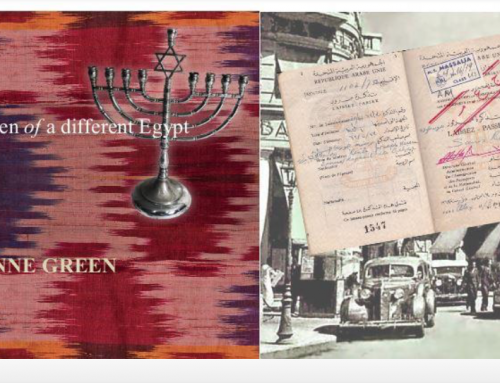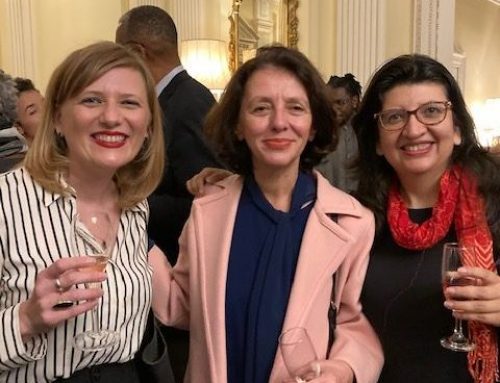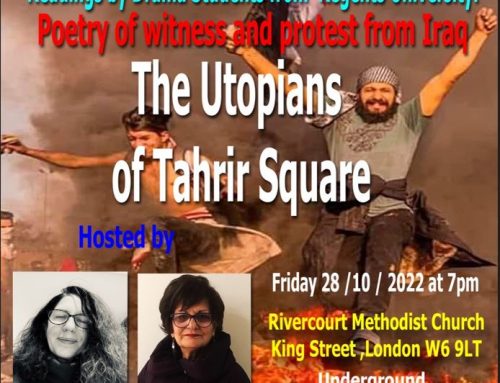By Catherine T Davidson
Reflections on EWI’s Second Agit Lit event
On February 5, I hosted an event at the Poetry Café in Covent Garden on behalf of Exiled Writers Ink, London’s longstanding umbrella organisation for refugee and immigrant poets and writers. It was our second “Agit Lit” event — where we combine an evening of poetry and performance with some kind of action on behalf of other writers elsewhere who do not have the power to speak for themselves.
On Monday, we shared the evening with Howell Productions, a young theatre company who have written a play about the imprisoned British Iranian woman Nazanin Zaghari-Ratcliffe. Longlisted for the Amnesty Freedom of Expression Award and praised as “political theatre at its best”, the hour-long production tells the story of a woman visiting her family in Iran, who was torn from her one year old daughter and thrown in prison, accused of being an international spy.
I had heard of Nazanin already, signed petitions and sent letters on her behalf. One of my friends in West London worked with her at the Thomson Reuters Foundation, a charity that promotes media freedom and the rule of law around the world. This story of a mother separated from her baby, of a husband stuck behind in England with no access to the murky world of Iranian justice, of the series of arbitrary accusations, detentions, near-releases, and heartbreaking set-backs, became part of the national discourse late last year when the bumbling foreign secretary mistakenly described Ratcliffe as a trainer of journalists — a blatant falsehood that reinforced the narratives of suspicion that shackle her. The backlash on her behalf sent him to Iran, finally, and hopes were raised again that she might be released over Christmas. As of today, she remains in prison.
The play takes us up to the present moment, and as I watched the young actors portray the husband and wife at the heart of the story, and a variety of judges, journalists, politicians and guards, I was aware that Richard Ratcliffe was in the audience, and I could not help but imagine what it was like to see his life re-lived for a live audience, in the middle of story with no resolution.
Before the evening, I had been anxious. On a cold Monday night in London, there is no way to know how many people might show up. An hour before the start, people began to filter into the café, and by the time we let them downstairs into the performance space, we were so full a few people had to sit in the hallway.
After the play, Kathy Voss from Amnesty International gave a short speech about their campaigning work on behalf of Nazanin and of others unjustly imprisoned in Iran and elsewhere. She invited us to fill out letters she had brought and postcards that might join the pile of 20,000 they have not yet been allowed to deliver to her.
Then Richard Ratcliffe spoke. He told us that Nazanin and others imprisoned with her knew about the event that evening. Some were writers, and had written poems which would be shared later in the evening. They were pleased to know their words had made it all the way to listeners in London. I could not help but imagine those words — fragile, ephemeral and yet somehow alive, powerful — linking the women in their impenetrable prison to us, who were thinking about them with all our hearts.
After a break, Nasrin Parvaz read from her prison memoir, published in Italian, currently being backed by Unbound for the English translation. She was 20 years old at the time of the Iranian revolution, and fought for women’s rights during the early years of the regime. Arrested, imprisoned and tortured, she was detained for 8 years, escaping to England in 1993. Nasrin’s voice was gentle and steady, calm and soft, but underneath, you could sense her strength and determination. She read her fifth chapter, a story of interrogation and resistance. Her poet’s eye captured the images, the emotions, the physical moment, so that we were carried along with her.
I asked myself: Where did she get the strength to write the story, to read it? Yet for how many writers is the act of creation a form of strength, of salvation?
Our second reader was Ziba Karbassi, who left north-western Iran as a teenager, and who lives in London while being perhaps the most outstanding Persian poet of her generation. Ziba was the Chair of Exiled Writers Ink from 2012–2014; I had not met her before, but from the moment she started to read, I knew I was in the presence of a world-bestriding voice. She read with great power, her words physically pouring forth like notes played by an instrument carved from some gnarled and verdant tree. Stephan Watts, who has translated many of her poems, read us the English version, images and rhythms as shocking and startling, full of fury and sorrow, as her voice.
I looked at Ziba, her beautiful face, her wild hat and white rose, her platform slippers, and elegant fingers, and wondered, how was it that the angry, passionate voice of an ancient tree goddess existed inside that human body?
The final reader of the evening was Simone Theiss. Simone runs a blog, Ciluna27, advocating on behalf of imprisoned writers and others around the world. Earlier this year, she published poems Richard Ratcliffe had gathered from women imprisoned with Nazanin. Simone read some of these, and a poem from Nazanin herself, a beautiful poem reflecting on her daughter, who has turned three while she was in prison, how their “stories remain unfinished.” She also read a love poem from Golrokh Iraee to her husband, Arash Sadeghi. Both are writers, both currently in prison, “under the same sky of the same city,” together only as they “watch the trace of migrating birds”.
How do people become brave, I wondered. Is it something you find in yourself, surprising, like an unexpected talent you did not know you had? Is it something you cannot help, the way some are born with blue eyes and some with brown? Is it something you can cultivate? Does it grow, through contact, a social contagion?
My first thought at the end of the evening was relief — that we had filled the space, created the silence, listened and gathered the words, fulfilled our promise to take action.
The next morning, I woke too early and lay in bed, thinking of the women, their real physical selves, and the link we made to them with our real, physical selves, through the smallest, most fragile of instruments — a spoken word.
The word — sometimes I doubt it, even deny it. Yet sometimes I believe what Shelley told me in his poem; it remains, stronger than tanks, stronger than strongmen, stronger than the tallest Ozymandias whose feet crumble into dust while the word leaps, nimbly, ephemerally, light as a butterfly, out over the bars and into the air.




